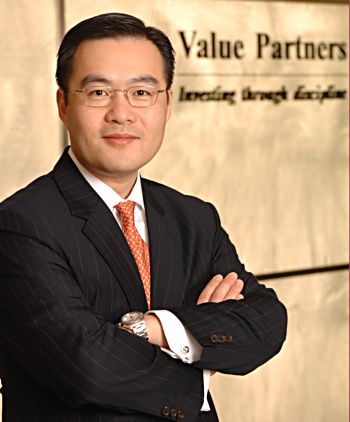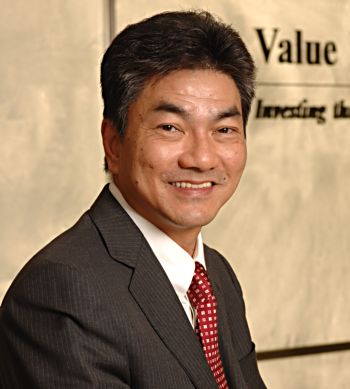The writer is with Aries Consulting in Hong Kong

WHEN Nikhil Rastogi from Kabouter Management LLC suggested a meeting with Value Partners (806 HK), I was surprised. I thought: Why would you want to visit a fund management company when you are one yourself?
Nikhil explained that using the valuation matrix to evaluate listed fund management companies (Market Capitalization/Assets Under Management should be less than 0.2), Value Partners has emerged as a ‘value stock’ on his radar screen.
Nikhil works for Kabouter Management LLC, a New York-based fund manager managing assets around USD 130 million as at Dec 2008. They focus on smaller companies outside the US.
It was founded in late 2002 by Marcel Houtzager and Peter Zaldivar, formerly of Wanger Asset Management in Chicago (which is now owned by Bank of America).
The fund looks for businesses with reasonable economics and growth prospects, selling at decent valuations. Its investment horizon is at least five years.
Singapore investors would remember Kabouter Management as the substantial minority shareholders of Techcomp Holdings, HMI and Pacific Healthcare. Kabouter Management also has a 3% stake in Thomson Medical. In Hong Kong, Kabouter holds stakes in several consumer stocks.
Over the past 3 years, Kabouter Management has worked closely with Financial PR and Aries Consulting in identifying quality value companies in the Asia Pacific region. We have learnt a lot from our interaction with Kabouter who has been very patient in explaining to us, the approaches of various fund managers.
Recently, Mr Franco Ngan, the CEO of Value Partners, met us at Value Partners’ office at Three Pacific Place.
History of Value Partners
Value Partners Limited rose dramatically from the fringes of Hong Kong's asset management industry which is dominated by international brand names. The company has transformed itself from a start-up boutique into a regional investment management powerhouse in little over 10 years.
Incorporated in the British Virgin Islands, Value Partners began developing its current asset management business in 1993 under the stewardship of Cheah Cheng Hye, its present Chairman and Chief Investment Officer, and co-founder V-Nee Yeh. The company's first investment fund, the Value Partners Classic Fund, was launched with USD 5.6 million in assets under management and now forms part of a business with USD 3.2 billion US dollars in assets under management as at 31 Dec 2008.
When asked about his company’s unique proposition, Mr Ngan said that in 2000s, the Company’s focus on investing in under-researched areas of the market led to the creation of funds. Investors profited from deeply mis-priced small cap stocks, particularly those benefiting from the secular growth of the mainland Chinese economy.

Currently, 46.2% of Value Partners’ funds are accounted for by institutional investors. Pension funds account for around 14.9%, retail investors 12.2%, and endowments and foundations 9.5%. Funds of funds (the most affected since Madoff’s incident) account for 7.7%; high-net-worth individuals around 5.2% and the remainder are from family offices and trusts.
Ngan noted that Value Partners is attracting more investors, especially retail investors from South Asia.
At this juncture, Mr Ngan highlighted the 3Rs strategy adopted by the management when it comes to what to invest in:
- Right Business,
- Right Management,
- Right Price
“At the end of the day, we are investing in the business, not the stocks. Our fund managers consider themselves business analysts first and foremost as we view each investment as a purchase of a business rather than a stock. Because of this, we must have an in-depth first hand knowledge of the companies we invest in through site visits, face-to-face meetings with management, customers, suppliers and other stakeholders.
"In 2008, our investment team (18 fund managers, analysts and dealers) carried out more than 2,000 company visits, excluding phone interviews,” said Nr Ngan.
Investment process
Mr Ngan explained that all the investment team members contribute their ideas to all funds ensuring that each separate fund benefits from the firm's investment talent. However, each individual fund has a "caretaker," known as portfolio supervisor. This supervisor is responsible for the fund's well-being, thus ensuring that every fund receives individual attention despite the emphasis on a team approach.
The investment team is headed by the CIO, who is supported by the senior fund managers. The CIO and senior fund managers each has the assistance of fund managers and analysts working under them. The structure is based on the forming of small units.
The research and investment is implemented at the small unit level. Each unit leader is delegated with decision-making authority to conduct research and investment activities, and operates with a degree of autonomy. The aim is to ensure that as the overall fund size increases, the investment process is still executed through a boutique approach.
Value Partners adopts a generalist-specialist approach in the allocation of research responsibilities. This means fund managers and analysts do not cover specific sectors but instead function as experts on individual companies.
A strong emphasis is placed on proprietary research at Value Partners, with the majority of executed investment ideas generated in-house.
Going Forward
Ngan revealed that Value Partners would continue to with its “Bar-bell” strategy for product development. The Company will be developing two complementary categories of investment products: a premium suite and a high-capacity suite.
The premium suite would derive more of its income from performance fees. This category can be expected to do better in bull markets, as performance fees will rise substantially along with asset values. The products in this category may take longer to scale up. Examples of this category of products include their absolute return long-biased funds, long-short hedge funds and private equity funds.
On the other hand, high-capacity suite of products will derive income primarily from management fees. The inflow of assets would be primarily driven by the performance and active marketing of the products. The amount of assets under management would drive profit. These products would focus on mainstream stocks, giving them greater flexibility to scale up to match growth in demand.
Ngan also revealed that Value Partners has opened a new sales office in Singapore, one of Asia’s main financial services hubs, in June 2008. The new office will allow the Company to maintain closer contact with key clients based in Singapore and its vicinity, and provide them with a platform to extend the sales reach in the South East Asia market.
Financials
| HKD | 1H08 | FY2007 | 2006 (Pre-IPO) | 2005 (Pre-IPO) |
| Revenue (million) | 282 | 2,541 | 1,490 | 485 |
| Revenue Growth | NA | 70.56% | 207.14% | 32.28% |
| Operating Profit | 98 | 1,635 | 954 | 284 |
| Net Profit (million) | 88 | 1,420 | 856 | 237 |
| Net Profit Growth | NA | 65.8% | 261.2% | 41.5% |
| Earnings Per Share (HKD) | 0.0553 | 0.887 | 0.535 | NA |
| EPS Growth | NA | 65.8 | NA | NA |
| Dividend Per Share | 0.055 | 0.355 | NA | NA |
| PE Ratio | NA | 2.82 | 4.67 | NA |
| Dividend Yield | NA | 14.2 | NA | NA |
| Dividend Payout | NA | 40% | NA | NA |
| Book Value (HKD) | 0.496 | 0.759 | NA | NA |
| Cash and Cash Equivalents | 683 | 745 | 272 | 193 |
Issued Capital – 1.6 billion shares post listing
In line with the weakness in the equity market, Value Partners’ revenue and earnings tumbled in the interim results. Trading at HKD 2.50, Value Partners is valued at 2.82x historical FY07 PE but this ratio is likely to increase given the drop in profitability.
The yield based on FY07 dividend per share of HKD 35.5 cents, is 14.2%. During 1H2008, the board gave out 100% of the interim profit - which is unlikely to be repeated in the future. Currently, the market capitalization of the Company is HKD 4 billion.







